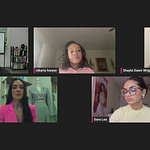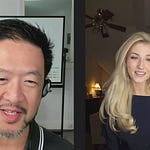Each week, I share no-fluff pageant coaching that helps you win. Both on stage and off. After coaching titleholders in Miss Universe, Miss USA, Miss America, and 350+ pageant interviews, this isn’t theory. It’s what works.
When Did Mature Become a Bad Thing?
I was working with a new pageant interview client today. She had just aged out of Teen and was about to compete in her second-ever Miss competition. Her mother had originally sent me a DM on Instagram saying that her daughter had always scored well in interview but that there would almost always be at least one comment about how she needed to show more “personality” or that she sounded too rehearsed.
One even went as far as to say they felt she was just telling them what they wanted to hear.
There’s no doubt that feedback like that can be confusing (as well as frustrating). This young woman turned out to be super sharp and articulate, which some judges (especially in Teen competitions) can see as being too “mature.” I’ve worked with multiple Teen contestants who received similar feedback—all of it along the lines of them almost interviewing too well, or that they interviewed like a Miss rather than a Teen.
I personally think this is bogus advice. I was extremely mature growing up, and if you were to tell me that the reason I didn’t win a competition was because I sounded too “mature,” then my conclusion would automatically be that this clearly wasn’t a competition for me.
That being said, pageant judges sometimes don’t say what they mean. I’m not saying that they’re not telling you the truth (although that can be a distinct possibility at times). What I am saying is that sometimes they struggle to articulate their thoughts just as much as you might during an interview.
What Does the Feedback Actually Mean?
By now, most of you know that my coaching runs deep. I focus on mindset and root causes, not surface-level band-aid solutions. In this case, I needed to determine what the judge actually meant when they said my client hadn’t shown enough “personality.”
After all, unless you decode what the feedback actually means, how can you get to work on it?
Here was the conclusion we ended up with:
Showing “personality” actually means needing to appear relatable.
In order to be relatable, you need to share your struggles.
This makes you imperfect, human, and ultimately relatable.
Sharing struggles gave my client the ick (“Why would anyone want to hear about my problems?”).
On top of that, she was intelligent, and some of her friends had called her “intimidating.”
When you add this all up, the judge’s comment begins to make more sense. It wasn’t really about personality at all; it was about the need to be relatable by showing people that you weren’t perfect and that you had struggles like everybody else.
And when you couple this with a sharp intellect and an impressive résumé, some judges are going to view that as showing off and will immediately mark you down. But here’s the moral of the story:
They won’t write that.
Ninety-nine percent of the time, they’ll phrase it in a more palatable way such as “needs to show personality,” which leaves you feeling confused because it’s such a vague concept.
The next time you get vague, confusing, or frustrating feedback in your pageant, decode what it really means before getting to work. Otherwise, you might spend a year fixing the wrong thing—or polishing a flaw that never existed in the first place.
⏱️ Timestamps
0:00 – Special Offer: Become Adrian’s “guinea pig” for new AI-based mock interview testing
2:34 – The Client Story: Teen contestant moving into Miss division and confusing judge feedback
5:49 – “Too Rehearsed” Confusion: When you get feedback that doesn’t fit your actual prep
7:35 – What Judges Really Mean: “Show more personality” = “Be more relatable”
13:18 – Why You Must Record Yourself: The danger of never watching your own interview back
16:04 – The Limits of Coaching Alone: It’s not just what you say, it’s how you say it
20:27 – The Hard Work of Self-Discovery: Doing the personal work that builds authenticity and confidence
26:16 – Final Thoughts & Call to Action: Do the work, record yourself, and reach out if you want to be the test client
I offer a limited number of private coaching sessions per month for women serious about elevating their pageant journey. Click below to book yours.
Pageantry is evolving, and you deserve coaching that’s more than surface-level. Book in if you’re ready to go beyond the crown.








